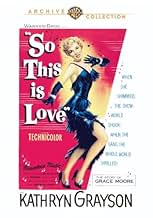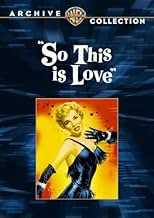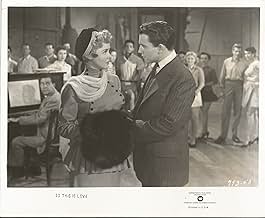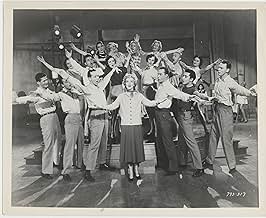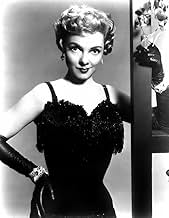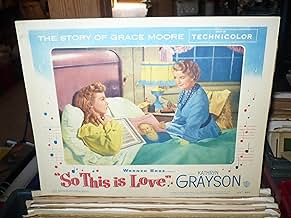VALUTAZIONE IMDb
6,0/10
282
LA TUA VALUTAZIONE
Aggiungi una trama nella tua linguaBiopic of opera star Grace Moore, who was killed in a plane crash in 1947.Biopic of opera star Grace Moore, who was killed in a plane crash in 1947.Biopic of opera star Grace Moore, who was killed in a plane crash in 1947.
- Regia
- Sceneggiatura
- Star
John Alban
- Opera Spectator
- (non citato nei titoli originali)
Bill Alcorn
- Backstage Performer
- (non citato nei titoli originali)
Jerry Antes
- Chorus Boy
- (non citato nei titoli originali)
William Bakewell
- Charles, Waiter
- (non citato nei titoli originali)
Recensioni in evidenza
Before watching this biopic starring Kathryn Grayson, I'd never heard of the opera star Grace Moore. If you've never heard of her either, do an online search and learn about a woman who contributed her talents to films, Broadway, and opera. She was beautiful and had a beautiful voice, so it's no wonder Hollywood chose Kathryn Grayson to portray her!
The main problem with the film is, unfortunately, how John Monks Jr. wrote Grace's character. From her childhood through the end of the movie, she's portrayed as a snotty brat! As she pushes and pouts her way to the top, I found myself only halfway rooting for her. Kathryn is a very likable actress, so that helped me get through it. Still, Grace Moore wasn't painted out in a very favorable light. She's written to be selfish, arrogant, too big for her britches, disrespectful, and unwilling to pay her dues. I wonder why the script wasn't changed-or perhaps it had been, and Miss Moore was even more unlikable in real life!
Still, Kathryn gets to show off her beautiful voice and her distracting figure. She's joined by Walter Abel, Rosemary DeCamp, Merv Griffin, Joan Weldon, and Douglas Dick, but besides Walter-who plays her frustrated father-no one else is really given anything to do. As biopics go, this one's really only watchable because Kathryn Grayson is so cute and has such a beautiful voice. If you're looking for one that stands on its own merit, watch Love Me or Leave Me.
The main problem with the film is, unfortunately, how John Monks Jr. wrote Grace's character. From her childhood through the end of the movie, she's portrayed as a snotty brat! As she pushes and pouts her way to the top, I found myself only halfway rooting for her. Kathryn is a very likable actress, so that helped me get through it. Still, Grace Moore wasn't painted out in a very favorable light. She's written to be selfish, arrogant, too big for her britches, disrespectful, and unwilling to pay her dues. I wonder why the script wasn't changed-or perhaps it had been, and Miss Moore was even more unlikable in real life!
Still, Kathryn gets to show off her beautiful voice and her distracting figure. She's joined by Walter Abel, Rosemary DeCamp, Merv Griffin, Joan Weldon, and Douglas Dick, but besides Walter-who plays her frustrated father-no one else is really given anything to do. As biopics go, this one's really only watchable because Kathryn Grayson is so cute and has such a beautiful voice. If you're looking for one that stands on its own merit, watch Love Me or Leave Me.
SO THIS IS LOVE is said to be based on a biography of singer Grace Moore, but it only touches on her early life and determination to become an opera singer, up until her New York City debut at the Metropolitan Opera House in "La Boheme." Before it reaches that point, it gives KATHRYN GRAYSON a chance to sing a variety of songs in coloratura style, but since the story does not cover Miss Moore's Hollywood career at all, many of her most well-known songs had to be omitted. Instead, we get a sprinkling of a few opera numbers and many other pop standards, all of them suitable for Grayson's voice. She's in fine form vocally and delivers all of the songs with her customary charm and grace.
MERV GRIFFIN, before his celebrity and TV fame, makes his second appearance in a movie as one of Miss Moore's admirers and gets to warble "I Kiss Your Hand Madame" while doing a nice job on the vocals. WALTER ABEL and ANN DORAN play Grayson's parents, not at all thrilled that she wants to leave her small town life for a fling at stardom in the big city.
Grayson has a role that is tailor-made for her own background as a singer. DOUGLAS DICK is rather colorless as another disappointed suitor who can't compete with her operatic ambitions, but FORTUNIO BONANOVA is excellent as a sympathetic voice coach who makes sure that she takes proper care of her throat condition before returning to him for his coaching.
The story simply ends with her first appearance at the Met as Mimi in "La Boheme." Opera fans should enjoy this tribute to Miss Moore, and fans of Miss Grayson should appreciate the care taken to photograph her in beautiful close-ups while she takes aim at arias by Gounod and Puccini.
MERV GRIFFIN, before his celebrity and TV fame, makes his second appearance in a movie as one of Miss Moore's admirers and gets to warble "I Kiss Your Hand Madame" while doing a nice job on the vocals. WALTER ABEL and ANN DORAN play Grayson's parents, not at all thrilled that she wants to leave her small town life for a fling at stardom in the big city.
Grayson has a role that is tailor-made for her own background as a singer. DOUGLAS DICK is rather colorless as another disappointed suitor who can't compete with her operatic ambitions, but FORTUNIO BONANOVA is excellent as a sympathetic voice coach who makes sure that she takes proper care of her throat condition before returning to him for his coaching.
The story simply ends with her first appearance at the Met as Mimi in "La Boheme." Opera fans should enjoy this tribute to Miss Moore, and fans of Miss Grayson should appreciate the care taken to photograph her in beautiful close-ups while she takes aim at arias by Gounod and Puccini.
If Grace Moore were still alive I'm sure she'd have been pleased that she was tributed by another great soprano in the person of Kathryn Grayson. But she'd probably wonder where are all the songs that she made famous.
Probably because the two American studios that she worked for, first MGM and then Columbia held all the copyrights and Jack Warner wasn't about to shell out some big bucks for One Night Of Love, Love Me Forever and I'll Take Romance for his film. It makes me wonder why his studio chose Grace Moore as the subject of a biographical film.
The problem was somewhat solved by taking her story up to 1928, the year she made her Metropolitan Opera debut. All these songs were in the future. But they also managed to select a list of popular songs that she wasn't identified with at all. I did a bit of research on the subject and confirmed it. The only song that Grayson sings in So This Is Love that is both not operatic and identified with Grace Moore is Ciribiribin, cheerfully for Jack Warner in the public domain.
The story we get as far as it goes is that of young Grace Moore, born in Slabtown, raised in Jellico, Tennessee who had a burning ambition to sing. Nothing stood in her way and we see a few broken hearts like Merv Griffin's and Douglas Dick's left by the wayside. What's not shown here is that Grace Moore was every inch southern born and bred and that includes a few negatives I think you can figure out.
What Grace Moore was however was one of the greatest entertainers of the 20th century. She conquered five mediums, the musical stage, grand opera, recordings, radio, and film. The last three get no mention at all. She was the most popular selling classical artist between Enrico Caruso and Mario Lanza on record, she was a Hollywood star as I said before later in her career, and she appeared numerous times on radio on the Bell Telephone Hour. Not touching on any of that in So This Is Love does Moore an injustice.
Her life story would make a compelling film if the real story were told and maybe Columbia could do it and dub her voice to a current actress. There are surely none around like Kathryn Grayson who could actually sing those songs.
Probably because the two American studios that she worked for, first MGM and then Columbia held all the copyrights and Jack Warner wasn't about to shell out some big bucks for One Night Of Love, Love Me Forever and I'll Take Romance for his film. It makes me wonder why his studio chose Grace Moore as the subject of a biographical film.
The problem was somewhat solved by taking her story up to 1928, the year she made her Metropolitan Opera debut. All these songs were in the future. But they also managed to select a list of popular songs that she wasn't identified with at all. I did a bit of research on the subject and confirmed it. The only song that Grayson sings in So This Is Love that is both not operatic and identified with Grace Moore is Ciribiribin, cheerfully for Jack Warner in the public domain.
The story we get as far as it goes is that of young Grace Moore, born in Slabtown, raised in Jellico, Tennessee who had a burning ambition to sing. Nothing stood in her way and we see a few broken hearts like Merv Griffin's and Douglas Dick's left by the wayside. What's not shown here is that Grace Moore was every inch southern born and bred and that includes a few negatives I think you can figure out.
What Grace Moore was however was one of the greatest entertainers of the 20th century. She conquered five mediums, the musical stage, grand opera, recordings, radio, and film. The last three get no mention at all. She was the most popular selling classical artist between Enrico Caruso and Mario Lanza on record, she was a Hollywood star as I said before later in her career, and she appeared numerous times on radio on the Bell Telephone Hour. Not touching on any of that in So This Is Love does Moore an injustice.
Her life story would make a compelling film if the real story were told and maybe Columbia could do it and dub her voice to a current actress. There are surely none around like Kathryn Grayson who could actually sing those songs.
MGM scored a big and rather unexpected hit in 1951 with *The Great Caruso*, their very fictionalized bi op of the great Neapolitan tenor. The success was the result of several features, such as a good mix of recognizable operatic numbers and well-known Neapolitan songs. But the real winning card was Mario Lanza as Caruso. Himself the product of the poor Italian neighborhoods of South Philly, with a build like a stevedore that made him look like "a real guy" to Americans of all classes, Lanza was perfect for making a larger-than-life individual come across on screen bursting with life.
Warner Brothers could therefore be forgiven for trying to do the same thing with the American soprano Grace Moore. Moore had been a success on Broadway for a few years, then had a good if not stellar career at the Met. But it was with movies like *One Night of Love* (1934), *When You're in Love* (1937), and *I'll Take Romance* (1937), along with a lot of appearances on the radio, that Moore entered the general popular consciousness, in part because she was a good singer, in part because she was a fearless, vivacious lady in an era when most opera stars, and even many female movie stars, were still intent on being seen as "ladies." Just as Caruso was famous for (being accused of) pinching a lady in the monkey house at the zoo, Moore, to some of the same extent, crossed the line from the world of classical music to the world of Joe and Jane Smith.
It would therefore have made sense to focus on this aspect of Moore's life and career in a movie about her that was being marketed to a general audience.
For whatever reason, Warner Brothers did not do this.
Instead, this movie focuses on Moore's career up until her arrival at the Met, and does not make any effort to suggest that she was "a wild and crazy lady." (You wouldn't hire Kathryn Grayson for that, anyway.) We get a paint-by-the-numbers story of an almost uninterrupted rise to success, and it isn't interesting.
Nor, as others point out, do we get much of the popular music that was associated with Moore. Her one performance of Ciriciribin gets interrupted before the last high note, which is what Moore had been famous for. (It's even referenced in *Funny Woman*.)
There's also another problem with this movie: it is the story of a woman who put career before love and family, but then doesn't do much with that. For American audiences in 1953, that was still a fairly radical theme, and should have been developed a lot more carefully.
There are all sorts of other, lesser problems. It is very antiseptic. The movie starts off when Moore is a child in Tennessee, but NO ONE speaks with even a hint of a Southern accent. Later, Moore sings with the great Irish tenor John McCormack, but he neither speaks nor sings with an Irish accent.
In general, the film looks cheaply made, the way Warner Brothers' 1952 April in Paris looks cheap after MGM's lavish 1951 An American in Paris. (April in Paris is still a lot better movie than this, though, thanks in large part to better music and Doris Day.)
If you want to learn about Grace Moore, read her entertaining autobiography *You're Only Human Once*. (I think there's also a biography, but I can't remember the title and couldn't find it on amazon.com) This movie makes her seem boring, and that is one adjective that no one who remembered her from when she was popular would associate with her.
Warner Brothers could therefore be forgiven for trying to do the same thing with the American soprano Grace Moore. Moore had been a success on Broadway for a few years, then had a good if not stellar career at the Met. But it was with movies like *One Night of Love* (1934), *When You're in Love* (1937), and *I'll Take Romance* (1937), along with a lot of appearances on the radio, that Moore entered the general popular consciousness, in part because she was a good singer, in part because she was a fearless, vivacious lady in an era when most opera stars, and even many female movie stars, were still intent on being seen as "ladies." Just as Caruso was famous for (being accused of) pinching a lady in the monkey house at the zoo, Moore, to some of the same extent, crossed the line from the world of classical music to the world of Joe and Jane Smith.
It would therefore have made sense to focus on this aspect of Moore's life and career in a movie about her that was being marketed to a general audience.
For whatever reason, Warner Brothers did not do this.
Instead, this movie focuses on Moore's career up until her arrival at the Met, and does not make any effort to suggest that she was "a wild and crazy lady." (You wouldn't hire Kathryn Grayson for that, anyway.) We get a paint-by-the-numbers story of an almost uninterrupted rise to success, and it isn't interesting.
Nor, as others point out, do we get much of the popular music that was associated with Moore. Her one performance of Ciriciribin gets interrupted before the last high note, which is what Moore had been famous for. (It's even referenced in *Funny Woman*.)
There's also another problem with this movie: it is the story of a woman who put career before love and family, but then doesn't do much with that. For American audiences in 1953, that was still a fairly radical theme, and should have been developed a lot more carefully.
There are all sorts of other, lesser problems. It is very antiseptic. The movie starts off when Moore is a child in Tennessee, but NO ONE speaks with even a hint of a Southern accent. Later, Moore sings with the great Irish tenor John McCormack, but he neither speaks nor sings with an Irish accent.
In general, the film looks cheaply made, the way Warner Brothers' 1952 April in Paris looks cheap after MGM's lavish 1951 An American in Paris. (April in Paris is still a lot better movie than this, though, thanks in large part to better music and Doris Day.)
If you want to learn about Grace Moore, read her entertaining autobiography *You're Only Human Once*. (I think there's also a biography, but I can't remember the title and couldn't find it on amazon.com) This movie makes her seem boring, and that is one adjective that no one who remembered her from when she was popular would associate with her.
I saw this film many years ago and would love to see it again. I also wish it were available in DVD. It is the true story of Grace Moore, who was born in Tennessee in 1898. She was a singer of Broadway musicals, an opera star, and a lovely lady Florenz Ziegfeld described as "the most beautiful woman in the world." Tragically, Miss Moore was killed in a plane crash in Copenhagen, Denmark, in January 1947. Also on board was a member of the Danish royal family. In the nearly six decades after her death, Miss Moore's talent lives on in the recordings of her music.
I hope this film will be appreciated by today's young people and that they will learn valuable lessons from it.
I hope this film will be appreciated by today's young people and that they will learn valuable lessons from it.
Lo sapevi?
- QuizKathryn Grant's film debut.
- BlooperGrace's hometown is misspelled "Jellicoe" instead of "Jellico." While this mistake has been made over many decades by many others, you'd think someone in a biopic production would at least make a phone call or check a map to get it right.
I più visti
Accedi per valutare e creare un elenco di titoli salvati per ottenere consigli personalizzati
Dettagli
- Data di uscita
- Paese di origine
- Lingua
- Celebre anche come
- So This Is Love
- Luoghi delle riprese
- Azienda produttrice
- Vedi altri crediti dell’azienda su IMDbPro
- Tempo di esecuzione1 ora 41 minuti
- Proporzioni
- 1.37 : 1
Contribuisci a questa pagina
Suggerisci una modifica o aggiungi i contenuti mancanti

Divario superiore
By what name was Sogno di boheme (1953) officially released in India in English?
Rispondi
